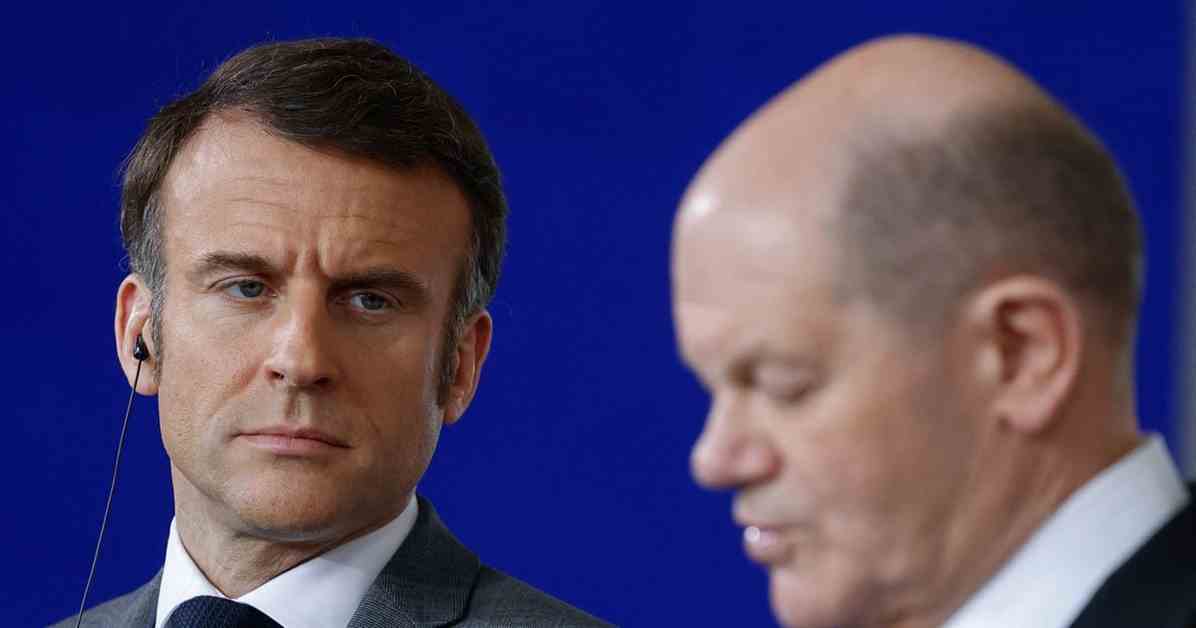Macron and Scholz: Two Contrary Winds United by War, by Marion Van Renterghem
In a time when the war in Ukraine has highlighted the differences between France and Germany like never before, it has also forced both countries to consider coming together on the issues that divide them the most, especially defense. The subtle shifts in Olaf Scholz’s face, aptly nicknamed « Scholzomat » for his seemingly emotionless demeanor, can serve as a barometer of the atmosphere.
On February 26 at the Elysée, following the Paris conference where Emmanuel Macron announced, without consultation, that the deployment of Western « ground troops » in Ukraine was not to be ruled out, the icy coldness of Scholzomat seemed to have reached a point of no return. However, on May 28 in Germany, prior to the Franco-German ministerial council meeting in Meseberg, the opposite was true. Olaf looked at Emmanuel with a smile. He seemed almost enthusiastic.
Despite President Macron taking a significant step by declaring that the weapons delivered by France to Ukraine could target military sites on Russian territory, Chancellor Scholz remained cautious. He approved without waiting for Joe Biden’s similar decision three days later. While he still opposes the delivery of Taurus missiles to Ukraine, he left open the possibility that less powerful weapons could target sites in Russia. « It must be said clearly: [Ukraine] is under attack and has the right to defend itself, » stated Olaf Scholz, invoking « international law. » France, on the other hand, took a more cautious approach to reassure him: « This is not a change in strategy, but an adaptation to the mode of Russian aggression, » according to a source at the Elysée. While the chancellor is against sending military personnel to Ukraine, he also did not oppose the dispatch of instructors as part of a coalition of countries led by France, which already has special forces there.
The German president played the anti-Scholtz role during Emmanuel Macron’s visit to Germany, marking further progress not only in assisting Ukraine but also in easing tensions between the Franco-German duo revealed by the war. The state visit preceding the Meseberg ministerial council meeting, the first by a French president to Germany since Jacques Chirac’s in 2000, greased the wheels. President Frank-Walter Steinmeier clearly took the anti-Scholz stance to counter the image of a Germany hesitant to move towards the « European strategic autonomy » advocated by the French head of state. He even thanked Emmanuel Macron for his « visionary ideas, » which have a way of frustrating a pacifist Germany where industry trumps geopolitics: « You’re trying to get us out of our reserve. »
In terms of strategic culture and defense, the main current issues, the points of contention and irritation remain deep around three axes: the common budget, as always, but also the relationship with NATO and the battle for leadership in European security. Post-war Germany, which owes its democratic identity, reunification, and defense to the United States, is wary of a European « strategic autonomy » that undermines the Atlantic Alliance. This fundamental difference is further complicated by a leadership battle, as Germany invests heavily in once nonexistent defense, and France has become the only EU power with nuclear deterrence and a seat on the UN Security Council since Brexit. Emmanuel Macron suggests extending French deterrence to Europe, but Olaf Scholz is hesitant and prefers to consider shared leadership.
On the foundation of this fundamental divide, and especially when French and German leaders do not see eye to eye, diplomacy can only move forward in small steps. The lack of historical progress, persistent irritations, and repeated stalls of the Franco-German engine do not preclude the steps taken, measured with symbols, weak signals, and a clear shared objective: European defense and support for Ukraine « as long as necessary. » Very little, very late.
* Marion van Renterghem is a senior reporter, winner of the Albert-Londres prize, and author of « The Nord Stream Trap » (Arènes)




